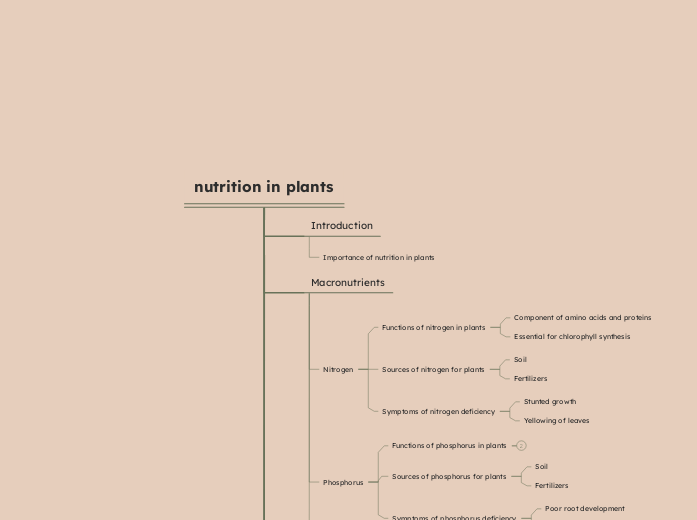nutrition in plants
Introduction
Importance of nutrition in plants
Macronutrients
Nitrogen
Functions of nitrogen in plants
Component of amino acids and proteins
Essential for chlorophyll synthesis
Sources of nitrogen for plants
Soil
Fertilizers
Symptoms of nitrogen deficiency
Stunted growth
Yellowing of leaves
Phosphorus
Functions of phosphorus in plants
Sources of phosphorus for plants
Soil
Fertilizers
Symptoms of phosphorus deficiency
Poor root development
Dark green or purple leaves
Potassium
Functions of potassium in plants
Enzyme activation
Regulates water balance
Sources of potassium for plants
Soil
Fertilizers
Symptoms of potassium deficiency
Wilting
Yellowing and browning of leaf edges
Micronutrients
Iron
Functions of iron in plants
Essential for chlorophyll synthesis
Involved in energy transfer
Sources of iron for plants
Soil
Iron chelates
Symptoms of iron deficiency
Yellowing of young leaves
Interveinal chlorosis
Zinc
Functions of zinc in plants
Enzyme activation
Regulates hormone balance
Sources of zinc for plants
Soil
Zinc fertilizers
Symptoms of zinc deficiency
Stunted growth
Chlorosis and malformed leaves
Manganese
Functions of manganese in plants
Enzyme activation
Involved in chlorophyll production
Sources of manganese for plants
Soil
Manganese fertilizers
Symptoms of manganese deficiency
Yellowing between veins
Reduced growth
Water and Mineral Uptake
Transpiration
Process of water movement in plants
Water loss through stomata
Pull of water through xylem
Factors affecting transpiration rate
Temperature
Humidity
Mineral uptake
Mechanisms of mineral absorption by roots
Active transport
Passive diffusion
Conclusion
Importance of providing proper nutrition for plant growth and development
